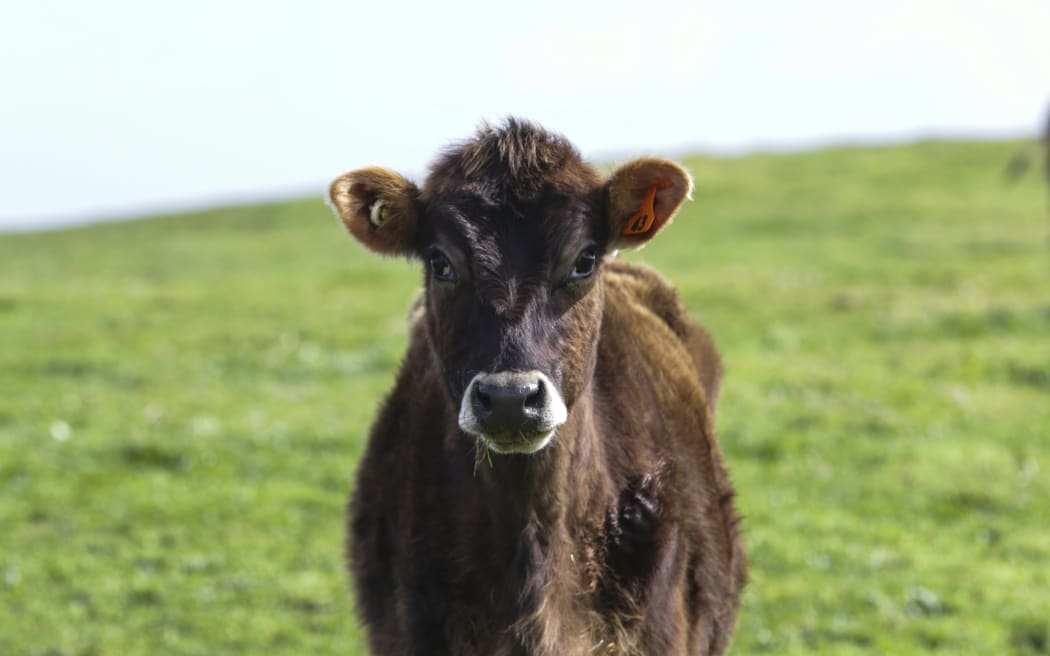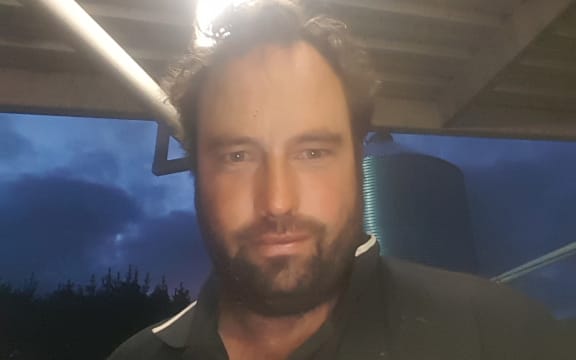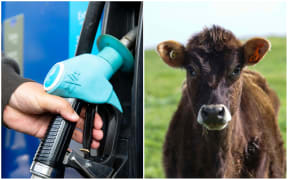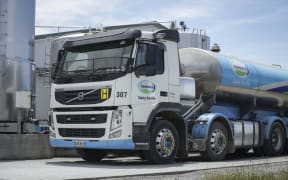
Fonterra has not actually committed to reducing the heating it is causing, only the heating per kilo of product. Photo: RNZ / Rebekah Parsons-King
Fonterra has announced plans for a 30 percent intensity reduction in on-farm emissions from 2018 levels by 2030.
It is a collective target, so not all farms need to have a 30 percent intensity reduction.
And it is an intensity target - not an overall reduction target - so the company has not actually committed to reducing the heating it is causing, only the heating per kilo of product.
Setting an intensity-based target goes against the recommendations of a high level UN expert group, and Greenpeace said it was "woefully insufficient" considering Fonterra's emissions output.
Last year the chair of the UN group, Catherine McKenna, said companies that wanted to say they were doing what was needed "cannot focus on reducing the intensity of their emissions rather than their absolute emissions or tackling only a part of their emissions rather than their full value chain (scopes 1, 2 and 3)".
Fonterra's scope 1 and 2 targets, which cover things like coal burning at its plants and tanker fuel, were absolute - the goal for those was to reduce greenhouse gas emissions by 50 percent by 2030.
But 86 percent of the dairy's company's emissions come from on-farm, so are covered by the new scope 3 intensity targets.
Announcing the plan at its general annual meeting in Methven on Thursday, the co-op expected to achieve the target through four different ways:
- 7 percent reduction through farming best practice such as feed quality and improving herd performance
- 7 percent reduction through novel technologies developed through AgriZeroNZ, a joint venture between agribusiness and government working to find a solution to methane, and other partnerships
- 8 percent reduction through carbon removals from existing and new vegetation
- 8 percent from historical land-use change conversions to dairy
Fonterra chairman Peter McBride said the on-farm emissions target would affect each farm differently.
"There is significant variation within and across farming systems when it comes to emissions intensity. We are confident that we can make solid progress towards our target by working together and sharing information farmer-to-farmer.
"There's no one solution to reducing on-farm emissions. It will require a combination of sharing best farming practices and technology to reduce emissions - it's both our biggest opportunity and our biggest challenge."
McBride said Fonterra had deep empathy for the challenges farmers were already dealing with.
"The co-op's approach will be to work alongside farmers, not against them, as we collectively make progress towards our target, including investing in methane reduction technologies."
Chief executive Miles Hurrell said there was a lot of activity to reduce emissions across other markets and the co-op needed to keep making progress to make sure it did not fall behind.
"New Zealand farmers are some of the most emissions efficient suppliers of dairy at scale, but work needs to continue to maintain this position.

Fonterra chief executive Miles Hurrell. Photo: RNZ / Dan Cook
"As a dairy partner to many of the world's leading food companies, we're responding to growing sustainability ambitions from our customers and financial institutions, along with increasing market access, legal and reporting obligations."
Fonterra's collective efforts to reduce emissions from on-farm, across operations and by research and development teams would help future profit the company, he said.
Fonterra's biggest customer welcomes the move
Food industry giant Nestle, Fonterra's biggest customer, welcomed the scope 3 target saying it sent a positive signal to the New Zealand dairy industry, and supported Nestlé's own ambition to reduce greenhouse gas emissions.
Nestlé New Zealand chief executive Jennifer Chappell said the company had sourced dairy from New Zealand for over 100 years.
"We will continue supporting farmers alongside our partners to develop new economic opportunities and reduce their greenhouse gas emissions.
"We do this by prioritising our sourcing from farmers engaged in lowering emissions, by providing technical support, and by paying a premium for their products."
'Woefully insufficient'
Greenpeace hit out at Fonterra's new plan, saying it would not make any meaningful difference.
"Fonterra is New Zealand's biggest climate polluter and has the third-highest methane emissions of all dairy companies in the world, but it wants us to accept that it can cut emissions through mythical techno-fixes and offsetting with grass and scattered trees.
"After decades of delay and denial, it's about time Fonterra took responsibility for its impacts on climate change. But with the scale of the industry pollution and impacts of climate change, Fonterra's plans are woefully insufficient."
But Federated Farmers dairy chairperson Richard McIntyre said the intensity reduction target made sense.

Richard McIntyre. Photo: Supplied
"Customers overseas, when they're buying a block of cheese or butter or a chocolate bar, they don't care so much about the absolute emissions that the farm had in producing it - they care about the emissions intensity.
"So how many emissions went into producing that product, so it makes sense from a market point of view."
McIntyre said the intensity-based target would land better with farmers as well.
"Farmers wake up everyday and have done for generations thinking about how to make their farm more efficient, so this is just a continuation of that - and I think Fonterra will get far better buy-in than if they made it an absolute emissions reduction."
McIntyre said farmers were not getting off lightly - as it would not be an easy road to meet the target.
"I think it is achievable, but one of the biggest set of unknowns is the new technology. We've been waiting for things to help us, whether that be feed additives or vaccines, and we keep getting told it's not far away - but it's still not here."
Fonterra set the target so it was vital it worked with its farmers to get there, he said.





